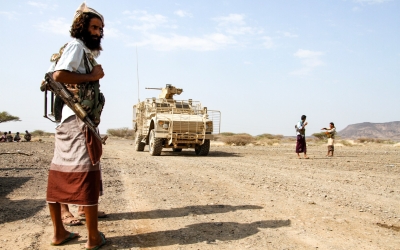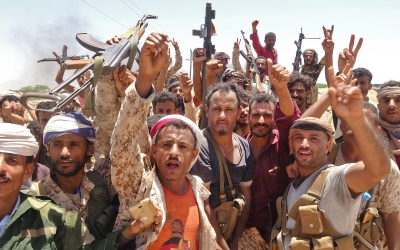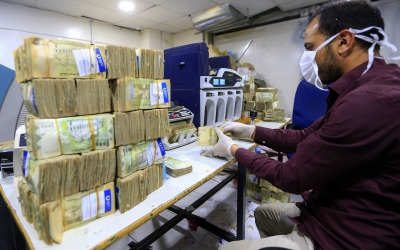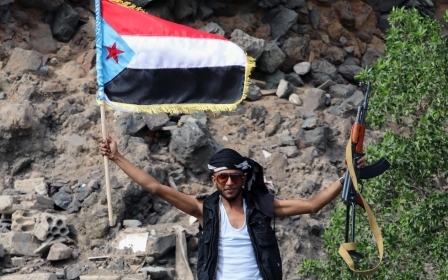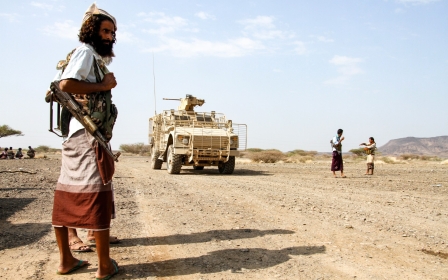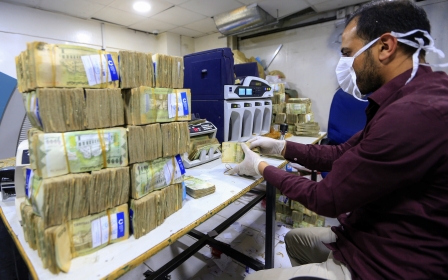Destitute African refugees in Yemen recruited by warring factions
Refugees and migrants from the Horn of Africa are used to taking up work in Yemen as they make their way north to relative safety and prosperity in Saudi Arabia. Picking up work that many Yemenis do not want to do, local residents have been generally receptive to their assistance.
That arrangement and atmosphere has soured considerably, however, with coronavirus restrictions and social stigma leaving them stranded and destitute. The answer for some has been to take up employment with Yemen's warring factions.
In May, authorities in the capital Sanaa announced their first case of the coronavirus, diagnosed in a Somali refugee.
The news led to discrimination against refugees in the country, leaving them no longer able to move among provinces, with locals and authorities considering them a source of Covid-19.
The refugees have found themselves under siege in areas such as Aden, Lahj and Taiz, often without food to eat or shelter to sleep.
Their perilous situation has encouraged armed groups such as the Yemeni Republican Guard to exploit their situation, recruiting many of them to work in military camps situated where fighting is taking place on the western coast.
The Republican Guard is led by Tareq Saleh, the nephew of the late president Ali Abdullah Saleh and the group is loyal to the United Arab Emirates (UAE), rather than Yemen's government.
Saleh's forces are battling Houthi fighters - with the frontline currently in Hodeidah - and some Yemenis in Taiz and the south believe that some of the refugees have been recruited to take part in the fighting itself.
'Dangerous journey'
Early last month, five Ethiopian refugees aged between 15 and 25 found themselves inside an old house in Taiz’s Al-Shimayateen district, having arrived on the coast at Ras Al-Arah in Lahj province just four days earlier.
“We travelled with a smuggler on a fishing boat and it was full, so he threw us in the sea and only those who can swim for long distances arrived to the land,” Amari, 19, one of the Ethiopians, told Middle Eaast Eye.
'Some were drowned in the sea. It was a dangerous journey until we arrived in Yemen'
- Amari, 19
“Some were drowned in the sea. It was a dangerous journey until we arrived in Yemen.”
The house in Taiz was rented by Najib, one of the military leaders battling on the western coast who had brought the refugees from Lahj as part of a plan to send them with others to the military camps.
The house acts a waiting area where refugees receive some basic information about what they will be expected to do.
“We fled our home to Djibouti, hoping to enter Saudi Arabia where some friends have already arrived during previous years,” said Amari.
“Saudi Arabia is the dream of all refugees, but when we were in Djibouti we called some friends who travelled before us and they said it is impossible to access Saudi as they can’t move freely in Yemen.
“They ended up in a military camp where they work together with Yemenis,” he said.
Dangers ahead
Amari and his fellow refugees appeared unaware of the scale of the danger they could face in the camps, but were happy as Najib had told them they would be paid in Saudi rials.
The refugees were reticent to talk about all the details of their situation, but they confirmed that a friend in a military camp had given them the mobile number of someone to call when they arrived in Ras Al-Arah.
Najib had met them there and brought them to the village in Taiz.
The refugees said they were not willing to return home until they had earned enough money to secure their future in Ethiopia.
After three days, the five youths left the village and a new batch of refugees arrived at the old house.
'Humanitarian step'
Najib denied that the refugees fight on the frontlines and said they only support the fighters there.
“There are misunderstanding about this issue, and some people think the refugees fight the Houthis with us, that isn’t true,” Najib told MEE.
“The refugees are only labourers in the military camps, and they help in cleaning the camps, carrying the weapons from the stores, building barracks and other physical work.”
Najib said they started to use the refugees as labourers after they found many of them sleeping outdoors and hungry.
“This is a humanitarian step and we can hire Yemenis for this work, but we said it is good to help the hungry refugees and we don’t want them to fall into the hands of Houthis who use them for fighting,” he said.
Some Arab media outlets have accused the Houthis of sending refugees to fight alongside them on occasions since the beginning of the war, an accusation the rebels have denied.
'Military camps are a target'
Many Yemenis have lost their jobs since the beginning of the war in Yemen in 2015, when a Saudi-led coalition intervened to restore the government of President Abd Rabbuh Mansour Hadi, which was kicked out of power in Sanaa by the Houthis in 2014.
As a result, some have joined the ongoing fighting as paid mercenaries or are willing to do the same work as the refugees in the military camps.
“If the work of the refugees is only cleaning and building, many Yemenis are willing to do it and I will be the first one,” Ahmed Ghanem, a 36-year-old resident of Taiz who lost his job at an airline in 2015, told MEE.
“I know that military leaders prefer the refugees because they agree on any amount and this is what happened with restaurants and other institutions.”
In most of the top restaurants in Yemen, the cleaners are usually refugees as they work hard and agree to low salaries which Yemenis will not accept.
Ghanem said that anyone working inside the military camps should be working under the leadership of the army, so the refugees should not be classed as labourers but should be treated as fighters.
“Military camps are a target for the enemies and anyone working inside those camps should be a fighter, even those who cook, clean and do other tasks,” he said.
“I think it is illegal to bring refugees to work in military camps, but I’m sure the government doesn’t know anything about this as the military camps on the western coast aren’t under its control.”
Torture, rape and executions
According to the International Organisation for Migration (IOM), 84,378 East African refugees were estimated to have arrived in Yemen in the first six months of 2019.
Coronavirus restrictions have reduced the number of migrant arrivals in Yemen by 90 percent in recent months, while also leaving tens of thousands of refugees, mainly Ethiopians, in limbo, the IOM said on Tuesday.
There are currently 281,000 refugees and asylum seekers seeking refuge in Yemen, mainly having fled the Horn of Africa, according to the UNHCR, the UN refugee agency.
The refugees often face exploitation, sometimes at the hand of officials.
In a report published in April 2018, Human Rights Watch (HRW) found that Yemeni government officials had tortured, raped, and executed migrants and asylum seekers from the Horn of Africa in a detention centre in the southern port city of Aden.
In another report in April 2019, HRW said: “Ethiopians undertaking the perilous journey by boat across the Red Sea or Gulf of Aden face exploitation and torture in Yemen by a network of trafficking groups.
"They also encounter abusive prison conditions in Saudi Arabia before being summarily forcibly deported back to Addis Ababa.”
Forcible transfers
On Tuesday, the IOM said at least 14,500 refugees, mostly Ethiopians, had been rounded up and forcibly transferred internally to cities including Aden and Marib amid fears they could contribute to the spread of the coronavirus.
IOM spokesman Paul Dillon told journalists in Geneva that an unknown number of the stranded migrants could be held in detention centres that had poor hygiene standards even before the outbreak of the virus.
He declined to give specifics regarding who was responsible for the transfers.
The UN says the virus is spreading unrestrained in a country with shattered health systems and inadequate testing capabilities after years of war, and that the actual number of cases is likely much higher than official reports.
With “most” migrants sleeping outdoors “or in unsafe abandoned buildings”, they are at greater risk of exposure to the coronavirus, Dillon said.
“They have little access to basic services like food, clean water or health care, a worrying situation given how pervasive the virus is believed to be in Yemen,” he added.
Yemen has recorded 1,516 cases and 429 deaths of Covid-19 on 14 July, but this is believed to be a vast underestimate.
Middle East Eye delivers independent and unrivalled coverage and analysis of the Middle East, North Africa and beyond. To learn more about republishing this content and the associated fees, please fill out this form. More about MEE can be found here.



